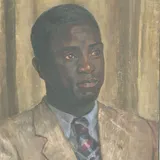
Dr Kenneth Dike
Pioneer of African studies
Biography
Dr Kenneth Onwuka Dike (PhD History, 1950) was an educator, historian and the inaugural Vice Chancellor of Nigeria’s first university: the University of Ibadan. Referred to as the ‘Father of West African Historiography’, Kenneth Dike (1917–83) made enormous contributions to the study of African cultural and historical heritage and set up the National Archives of Nigeria and the Historical Society of Nigeria.
A pioneer scholar in African historical studies (including the transatlantic slave trade and British colonial rule in west Africa), Kenneth played a critical role in the rise of modern African historiography. His African-centred orientation and promotion of the use of oral evidence by African historians contributed to the development of historical consciousness of Africa.
Kenneth began studying for a BA in English, Geography and Latin at Fourah Bay College in Sierra Leone in 1939; the degree was awarded to him four years later by the University of Durham, which was affiliated to Fourah Bay. In 1944, on a British Council Scholarship, Kenneth left Nigeria to pursue a master’s in History at the University of Aberdeen, graduating at the top of his class and receiving first-class honours in 1947. He then moved to King’s to study for his PhD. Working alongside Professor Vincent Harlow in the Department of History, in 1950, Kenneth submitted a ground-breaking thesis that would later form the basis of his seminal book Trade and Politics in the Niger Delta, 1830-1885. He was the first African to officially complete professional training in western historical scholarship.
After being awarded his PhD, Kenneth returned to Nigeria, and, between 1951 and 1955, carried out research at the West African Institute of Social and Economic Research. In order to assist historical research in Nigeria and decolonise the country’s history, he helped found the National Archives of Nigeria in 1954, becoming Director.
In 1955, Kenneth joined the history department of Nigeria’s University College Ibadan (the precursor to the University of Ibadan, which was established in 1963) as a senior lecturer, and became the first African appointee to the position of Professor of History and the first African to head a history department in 1956. In 1958, Kenneth became the first African principal, playing a pioneering role: transforming the curriculum, pushing the department in the direction of a more Africanist perspective and applying a multidisciplinary approach to the study of Africa’s past. He saw it as his role to train a new generation of African students who would go on to research African history professionally, as he was doing, and publish scholarly works. In 1962, he founded the Institute of African Studies at the University of Ibadan, which reconstructed pre-colonial African history with the help of oral and written sources. In 1963, as the head of the organising committee of the First International Congress of Africanists in Ghana, he championed the publication of research in various languages, including indigenous and foreign languages, to introduce native speakers to history and to present African history through a common eye.
In 1961, the University of Aberdeen conferred on Kenneth an honorary LLD (Legum Doctor, or Doctor of Laws) in recognition of his achievements (many similar honours followed from universities across the world) and, in 1965, he was elected Chairman of the Association of Commonwealth Universities.
Born in Awka in the present-day Nigerian state of Anambra, Kenneth was of Igbo heritage, and during the Nigerian Civil War (1967–70) became an ambassador of the seceding Biafran state, pleading for its international recognition in capitals such as Washington and Paris. After the Nigerian victory in 1970, Kenneth took up an academic position at Harvard, and was Chair of the Committee on African Studies (1971–73) and the first Mellon Professor of African Studies (1973–80). He returned to Nigeria in 1980, becoming the first president of Anambra State University (today, Chukwuemeka Odumegwu Ojukwu University).
